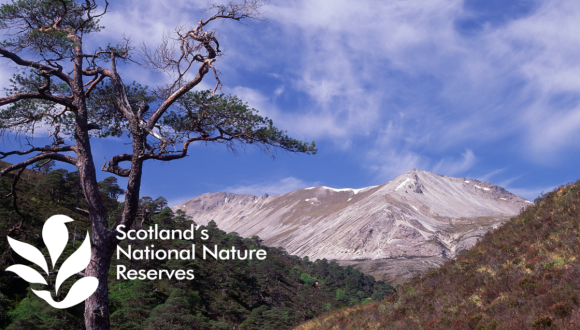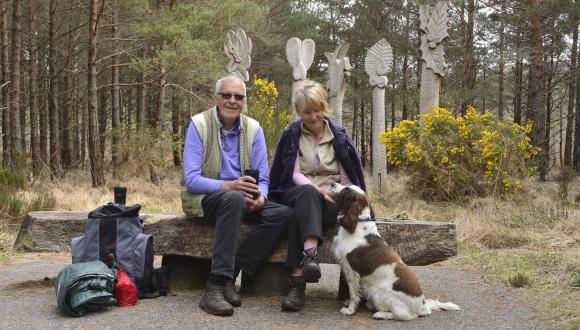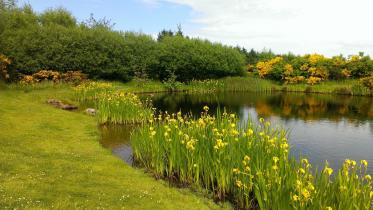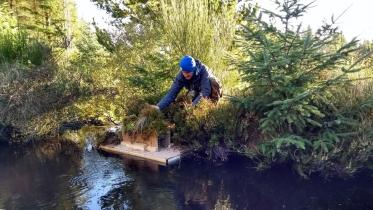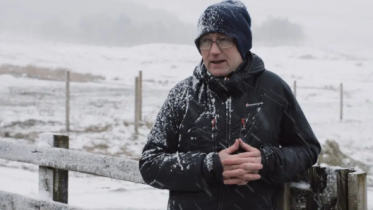Loch Maree Islands - Access to the Islands
Loch Maree Local Access Guidance
Loch Maree Islands are special and given their isolation have matured ancient woodlands that are some of the least disturbed by humans in the UK (Find out more in The Story of Beinn Eighe NNR). These habitats support many very rare species of plant, insect and bird. The Loch Maree Islands are nationally and internationally protected and designated a National Nature Reserve to protect the unique and important nature found here, including rare breeding birds such as Black-throated divers.
As such we have developed the following local access guidance in the form of a Code of Conduct:
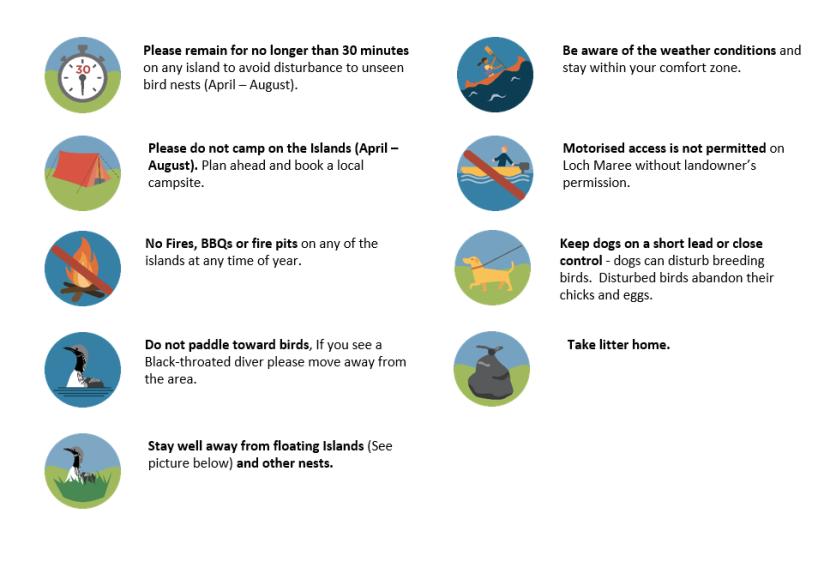
View a larger version of the Code of Conduct infographic
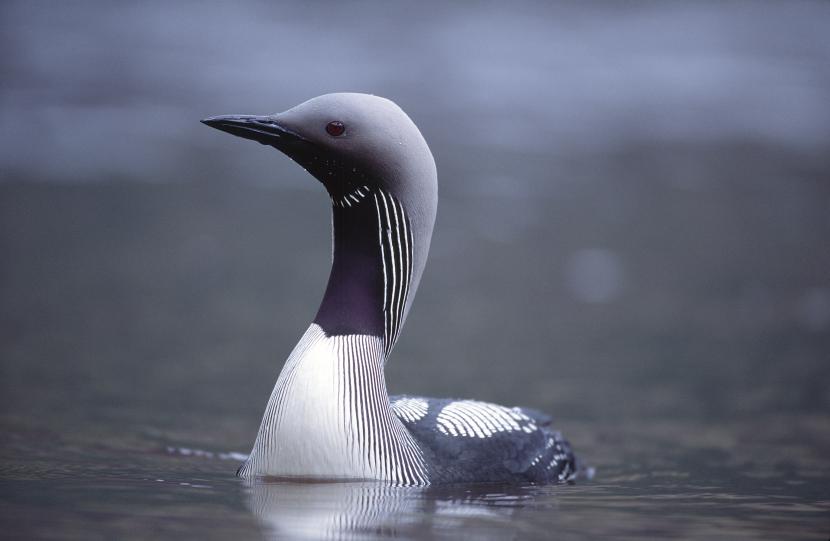
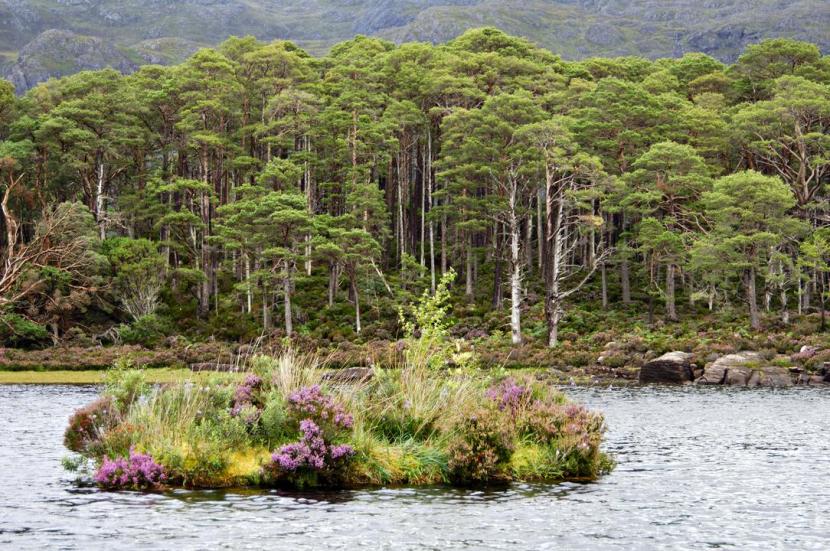
Black-throated divers are ‘Schedule 1’ birds meaning they are legally protected during the breeding season (see below for details). If you want more information on wildlife crime, and how to report a wildlife crime on this page.
Best practice advice for paddlers
- Be vigilant - From April – August, we advise that when out paddling you remain vigilant and look out for Black-throated divers and other wildlife. If you see a black-throated diver then it is best to paddle away from the bird(s) calmly, especially if you are close to the islands.
- Keeping on the move at a steady pace is likely to minimise disturbance to these birds.
- Paddle at a safe distance from wildlife. Try not to surround wild animals or block exit routes. If animals change their behaviour in reaction to your presence then move away.
- Try to keep noise and sudden movements to a minimum.
- Look then move on, don’t linger for too long. If you plan to stop near the shore, or are looking to land on an island, then it is best to view the area from distance (ideally with binoculars) and slowly approach to ensure there are no divers in the area. If you see any divers on land, or moving into the water from land, then you should immediately move away from the area quickly and calmly.
Access guidance for visiting Loch Maree Islands
Further information and context on the above advice
1. Breeding birds
This advice is to minimise disturbance to legally protected Black-throated divers, which are very rare birds that breed on the islands. Black-throated divers are specially protected by law, it is an offence to disturb them at the nest or while they have dependent young (Find out how Scotland’s wild birds are protected). Divers are particularly sensitive to disturbance and can be disturbed up to 500m of a nest and the rarity of these species means that these impacts could have population consequences. There are several pairs that breed throughout the islands.
a. Preferred access points to the islands (beaches) are often the chosen nest sites for divers. The nests are often well hidden and the adult birds will disappear from the nest if disturbed. Limiting the time on the islands minimises the risk to disturbing unseen nests.
b. Wild camping in proximity to a nest (even it is unseen) carries a high risk of disturbance to the birds. As this disturbance is prolonged then it is more likely to result in nest failure. Black-throated divers are Schedule 1 birds protected under the Wildlife and Countryside Act, and disturbing them at the nest or with dependant young is an offence. There is a camp site (tents only) at Taagan (NH01346373) at the Kinclochewe end of Loch Maree which is free to use, and a number of excellent local campsites. Overnight parking is not permitted at the Slattadale car park which is managed by Forestry and Land Scotland.
c. Canoeing & other non-motorised watersports has a high risk of disturbance for breeding Black-throated divers. They can be disturbed from a distance up to 500m, so if you see a black-throated diver then it is best to move away calmly until you are out of sight.
d. Floating islands (~2m x 2m) have been constructed to provide nesting spots for the Black-throated divers to minimise the risk from predators and flood risk. Please stay well away from these small islands during April to August.
e. We promote responsible access in our National Nature Reserves. The Scottish Outdoor Access Code advises that in a Nature Reserve “depending on your activity, you might be requested to follow a specific route or to avoid exercising access rights in a specific area. Following such local guidance can help to safeguard the natural heritage of these areas.”
2. Fires
The Scottish Outdoor Access Code state that you should “never light an open fire in areas such as forests, woods or on peaty ground”. The Loch Maree Islands are entirely either woodland or peaty ground, and as such open fires should not be lit on any island. Fires can be damaging to the legally protected vegetation and fires that get out of control can cause major damage, for which you might be liable. Access for fire crews tackling a wildfire on the island is difficult, and could be dangerous.
3. Safety
Please be aware of the weather conditions and stay within your comfort zone. Read advice on safe paddling on the Canoe Scotland website.
4. Camping
Isle Maree (GR NG931723) is a Scheduled Ancient Monument which means camping is not permitted without a scheduled monument consent from Historic Environment Scotland. For more information please refer to guidance relating to wild camping on Scheduled Ancient Monuments or email Historic Environment Scotland.
5. Dogs
During the bird breeding season, dogs can disturb nesting birds (especially ground, or low nesting birds). Disturbed birds can abandon their chicks and eggs, which means they are more vulnerable to be eaten by predators. During this time please keep dogs on a short lead or under close control especially around the loch shores.
